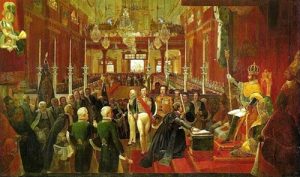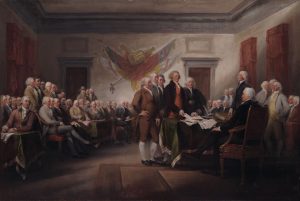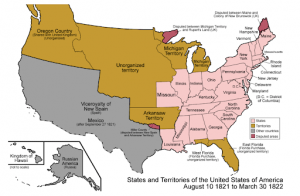Jean-Baptiste Debret, Coronation of D. Pedro I
Trumbull, Declaration of Independence
When Brazil declared its independence from Portugal on September 7th, 1822, many anxieties surrounded the new nation. In dealing with the creation of the new country, many Brazilian thinkers and statesmen looked to the United States as an example and a valuable ally. The United States was then a model for an independent, strong country in the Americas—a model that Brazil was eager to emulate. Furthermore, Brazil wished to consolidate its alliance with the U.S., in part to advance the economic interests of both nations, but also to protect itself from possible European recolonization efforts. The United States also saw Brazil’s independence positively, and tried to build a relationship with this new independent nation. The diplomatic affairs of this early period in U.S.-Brazil relations are summarized in Foreign Minister Rio Branco’s article below. In his view, the United States was the first country to recognize Brazil as an independent country and was a trustworthy ally. Additionally, the American view for the future of the Americas is described in the Monroe Doctrine, articulated in 1823, that warned against any encroachment of European powers in the Americas.
However, while Rio Branco defended a close relationship between Brazil and the United States, not everyone in Brazil was so eager about having the United States as an ally and model. Some of the anxieties surrounding this relationship can be read in excerpts from Eduardo Prado’s 1893 essay, “A Ilusão Americana.”
Readings:
José Maria da Silva Paranhos (Rio Branco), “Brazil, the United States, and the Monroe Doctrine”, 1908. | English
Documents:
James Monroe, “The Monroe Doctrine”, Speech to Congress, 1823. | English
Additional Readings:
Eduardo Prado, “A Ilusão Americana”, 1893. Excerpt (p. 22-48). | Português
Analysis from Conselho Editorial do Senado Federal. | Português
U.S. Expansion on the North American Continent
U.S. Territory at the Time of Brazilian Independence (Source)






